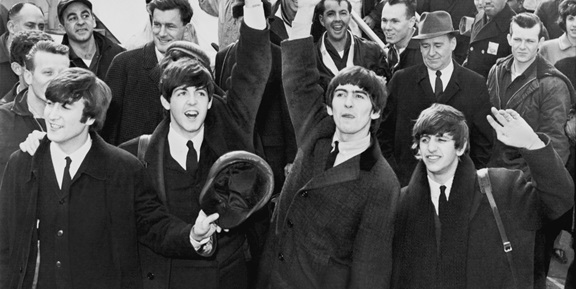On the Arrival of the Beatles
By Kristin Fritz

The Beatles/Photo via DOL.gov
On February 7, 1964, the English rock band the Beatles departed from Heathrow Airport bound for New York, where thousands of screaming fans awaited their arrival. Two days later, Paul McCartney, Ringo Starr, George Harrison, and John Lennon appeared on “The Ed Sullivan Show,” pulling in the largest viewership the show had yet seen. Writer Penelope Rowlands was there the day the Beatles arrived Stateside, cementing their status of rock and roll legends-in-the-making. In her new collection, The Beatles Are Here: 50 Years after the Band Arrived in America, Writers, Musicians & Other Fans Remember, Rowlands has gathered thoughts and essays from a fantastic group of people who were impacted in some way, shape, or form by the Beatles’ legacy – from Gay Talese to Lisa See, from Fran Lebowitz to Roy Blount Jr. Biographile caught up with Pamela to talk music, history, and, of course, her favorite Beatle.
BIOGRAPHILE: The Beatles – such a huge topic to cover, given all of their influence, history, controversy. What ultimately made you decide to do a collection of remembrances?
PENELOPE ROWLANDS: I knew that the fiftieth anniversary of the band’s arrival in the U.S. was approaching; at the same time, Vickie Brenna-Costa – one of the girls photographed with me back when the band was in town – had just contacted me via Facebook.
I hadn’t even known her name when that picture of us screaming together was taken for The New York Times. Suddenly, there she was! We became fast friends. The more we talked, the more I began to think that there might be a book in the experience that had brought us together – Beatlemania itself.
BIOG: When you were completely immersed in Beatlemania – including the day you were photographed screaming for them – do you recall at all what you were thinking? Can you articulate it today?
PR: I suspect that most of us Beatlemaniacs weren’t thinking at all. But we sure were feeling. Indeed, we were riding a wave of overwhelming passion. We loved the band – they were gorgeous and new and their music was so exciting – and we were united in fandom.
In retrospect, it seems as if our shrieking was addictive. And the media played a huge part. We got a lot of attention from radio, newspapers, TV, and fan magazines; we screaming girls seemed almost as newsworthy as the Beatles themselves! At times I suspect we shrieked as we did, in part, because it was expected of us.
BIOG: Considering how many people – artists, writers, performers, etc. – the Beatles somehow touched or influenced, how did you come up with your final list of contributors?
PR: I cast a wide net. I approached all sorts of people who might have been caught up in the first wave of Beatles fandom, and even some who arrived at it later on. I wanted the book’s contributors to be as diverse as possible. So I reached out to many, many people. In the end, the ones who were most responsive and attuned to the subject were the groups referred to in the book’s title: writers, musicians, and fans.
BIOG: Gay Talese says, in his essay, “The Beatles were four long-haired originals making their entrance into the city of opportunity. Their arrival was a departure from ordinary journalism. The Times’s editors decided that this foppish group of longhairs – these Liverpool lunatics – were worthy of history.” The Beatles’ arrival marked so much more than a departure from ordinary journalism. If you had to name the single most important effect of the Beatles’ arrival, what would that be?
PR: I think the most important thing the Beatles did for us at that moment was to bring us together. All of us. In his oral history in my book, Gay Talese reminds us how troubled the country, and specifically New York City, was in this period. There was a crushing despondency in the wake of President Kennedy’s assassination. The country was terribly divided along racial lines, and there was pervasive poverty.
This newly arrived band was, by contrast, pure joy. The Beatles united us in euphoria. Their wonderful music had a healing power – as did the cheerful absurdity that was Beatlemania itself.
BIOG: Fran Lebowitz’s essay – written from the point of view of a nonfan – is so entertaining. Were you at first surprised to learn she wasn’t a fan of the Beatles? And once knowing that, how did you work with her to develop the essay?
PR: Fran’s contribution was actually an interview, not an essay. She told me right away that she wasn’t a Beatles fan, assuming, I think, that I’d lose interest in talking with her at that point. But I had the opposite reaction. I was looking for diversity, after all, and a “nonfan” – especially one as articulate as Fran – fit nicely into that category. I was delighted when she agreed to take part.
There was no question of my helping to develop her response in any way. The woman is brilliant! She didn’t slow down for a minute. She talked through her remembrances in one long take. All I had to do was tape the interview – while occasionally shrieking with laughter.
BIOG: After all is said and done, who is your favorite Beatle?
PR: It’s odd – where once I was a committed George girl I seem to have changed allegiances entirely. Somehow, over the last decades, my attachment switched to Paul. I’m not sure I can explain why. Perhaps because of his clever songwriting or the wonderful things one hears about him as a husband to Linda, and as father. My change of heart was gradual and final. It’s mysterious – as inexplicable, perhaps, as Beatlemania itself.
